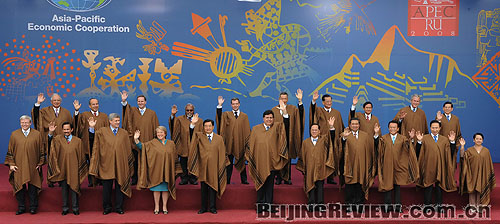|

IN PERUVIAN PONCHOS: Leaders of APEC member economies pose for a group photo at the 16th APEC summit on November 24 in Lima, Peru
Threatened by the global financial storm, world economies have become like hedgehogs in winter. They have to hold each other to keep warm, but also worry about being hurt if they get too close. To find the safest distance, world leaders have recently held a series of regional and global financial conferences.
One week after the Group of 20 (G-20) financial summit in Washington, D.C., the 16th Asia-Pacific Economic Cooperation (APEC) summit ended with a joint statement on November 22 in the Peruvian capital Lima. Nineteen leaders from the APEC member economies resolved to strengthen cooperation as they struggle to survive this bitterly cold economic season.
APEC prescription
Leaders of APEC member economies stressed the importance of reducing the gap between developed and developing member economies in the joint statement, known as the Lima Declaration. In addition to measures addressing the ongoing global financial crisis, the leaders also reached consensus on promoting cooperation in other areas for the long-term development of the region. These areas include free trade, corporate social responsibility, regional economic integration, food security, human security, anti-corruption and climate change.
Naturally, the financial crisis topped the APEC agenda. The Beijing Times, a People's Daily-based daily newspaper, highlighted four tactics in the released declaration.
The first was to take "urgent and extraordinary steps to stabilize our financial sectors and strengthen economic growth and promote investment and consumption."
The leaders promised to coordinate these steps together. "It is a guideline of regional cooperation," said the newspaper. It said that since there is still a gap inside APEC between developed economies, like Japan and the United States, and smaller and developing member economies, like Brunei and Papua New Guinea, closer cooperation was of special significance.
According to the statement, APEC economies agreed to support export credit agencies, international financial institutions and private banks so as to guarantee adequate and available financing to businesses, including small and medium-sized enterprises, and maintain normal regional trade and investment.
The second tactic was to oppose protectionism and support open markets. The leaders realized that protectionism brings nothing but economic deterioration. By contrast, an open trade and investment system would promote global economic growth, enhance employment and reduce poverty, said the newspaper. In the declaration, leaders promised to insist on free trade principles and push forward the WTO Doha Round talks.
The third tactic was reaffirming the Bogor Goals that APEC leaders outlined in 1994. According to these goals, developed economies in the region should realize free trade and investment by 2010, developing ones by 2020.
The last tactic was supporting innovation and reformation of financial markets and institutions, and welcoming the common principles of the Washington Declaration. The principles include strengthening transparency and accountability, enhancing sound regulation, promoting integrity in financial markets, reinforcing international cooperation and reforming international financial institutions.
China's opinions
China showed full support at the Washington and Lima summits for regional and international cooperation to cope with the global financial crisis as well as developing regional economic integration.
"We are ready to work together with the rest of the international community to preserve the stability of international financial markets," President Hu Jintao said at the APEC summit. He reiterated China's commitment to establishing a new international financial order that is fair, just, inclusive and orderly.
Hu made a five-point proposal concerning world economic and social development. He advocated building consensus and promoting sound development of the multilateral trading regime, shouldering responsibilities and jointly solving climate change, enhancing exchanges and cooperation to combat natural disasters, strengthening regulation and guidance and corporate social responsibility, and coordinating to guarantee world food and energy security.
"China has made active efforts within its ability and taken a range of important measures, including ensuring stability of the domestic financial system, increasing liquidity in financial markets and institutions and intensifying macroeconomic policy coordination and cooperation with other countries," he said.
According to China Business News, the best way to discourage protectionism is to make new progress in the Doha Round talks by the end of 2008. Zhang Xiangchen, Head of the Chinese Delegation to WTO, told China Business News on November 24 that China, as a country with large trade volume, is of special concern when it comes to how the financial crisis might influence world trade. "We hope the success of the Doha Round will send an active signal and increase people's confidence in the world economy," he said. Zhang pointed out that simple and transparent standards would be more effective than complicated tariff formulas in pushing forward the Doha Round. "To finish the negotiation, related economies must make compromises," he said. "China will do its best in accordance with its capability-no more, no less."
| 